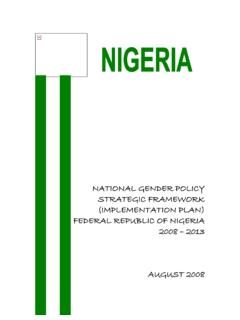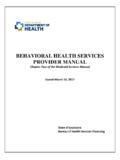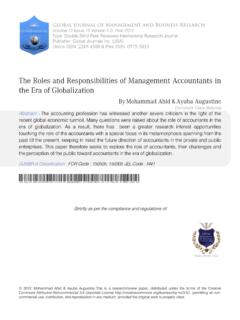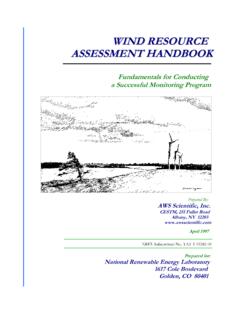Transcription of BEPS Action 14 on more effective dispute resolution peer ...
1 BEPS Action 14 on more effective dispute resolution Mechanisms peer review DOCUMENTS October 2016 BEPS Action 14 on more effective dispute resolution Mechanisms peer review DOCUMENTS October 2016 This document and any map included herein are without prejudice to the status of or sovereignty over any territory, to the delimitation of international frontiers and boundaries and to the name of any territory, city or area. Please cite this publication as: OECD (2016), BEPS Action 14 on more effective dispute resolution Mechanisms peer review Documents, OECD/G20 Base Erosion and Profit Shifting Project, OECD, Paris. OECD 2016 You can copy, download or print OECD content for your own use, and you can include excerpts from OECD publications, databases and multimedia products in your own documents, presentations, blogs, websites and teaching materials, provided that suitable acknowledgment of the source and copyright owner is given.
2 All requests for public or commercial use and translation rights should be submitted to Requests for permission to photocopy portions of this material for public or commercial use shall be addressed directly to the Copyright Clearance Center (CCC) at or the Centre fran ais d'exploitation du droit de copie (CFC) at OF CONTENTS 3 BEPS Action 14 ON more effective dispute resolution MECHANISMS peer review DOCUMENTS OECD 2016 Table of contents Introduction .. 5 Terms of Reference to Monitor and review the Implementing of the BEPS Action 14 Minimum Standard to Make dispute resolution Mechanisms more effective .. 7 Assessment Methodology for the Monitoring and review of the Implementation of the BEPS Action 14 Minimum Standard to make dispute resolution Mechanisms more effective .. 19 MAP Statistics Reporting Framework .. 33 Guidance on Specific Information and Documentation Required to be Submitted with a Request for MAP Assistance .. 57 INTRODUCTION 5 BEPS Action 14 ON more effective dispute resolution MECHANISMS peer review DOCUMENTS OECD 2016 Introduction The Action Plan on Base Erosion and Profit Shifting ( BEPS Action Plan )1 identified 15 actions to address BEPS in a comprehensive manner.
3 Recognising that the actions to counter BEPS must be complemented with actions that ensure certainty for taxpayers, Action 14 calls for effective dispute resolution mechanisms. In October 2015, the G20 Finance Ministers endorsed the BEPS package2 which includes the report on Action 14: Making dispute resolution Mechanisms more Effective3 ( the 2015 Action 14 Report ). This report contains a commitment by countries to implement a minimum standard to ensure that they resolve treaty-related disputes in a timely, effective and efficient manner. All members of the inclusive framework on BEPS4 ( Members ) commit to the implementation of the Action 14 minimum standard and to have their implementation reviewed pursuant to the Terms of Reference and Assessment Methodology agreed by Members. This compilation contains four documents, namely (i) the Terms of Reference; (ii) the Assessment Methodology; (iii) the Mutual Agreement Procedure (MAP) Statistics Reporting Framework; and (iv) the Guidance on Specific Information and Documentation Required to be Submitted with a Request for MAP Assistance.
4 The Terms of Reference translate the Action 14 minimum standard into 21 elements. These elements are complemented by 12 best practices. The best practices are not part of the minimum standard and thus will not affect the assessment of Members. The Terms of Reference assess a Member s legal and administrative framework, including the practical implementation of this framework to determine how its MAP regime performs relative to the 21 elements in the following four key areas (A) preventing disputes ; (B) availability and access to MAP; (C) resolution of MAP cases; and (D) implementation of MAP agreements. The Assessment Methodology establishes detailed procedures and guidelines for a two-stage approach to the peer review and monitoring process. Stage 1 involves the review of a Member s implementation of the minimum standard based on its legal framework for MAP and the application of this framework in practice. Stage 2 involves the review of the measures taken by the Member to address any shortcomings identified in its Stage 1 peer review .
5 The commitment by Members to implement the Action 14 minimum standard includes a commitment to provide timely and complete reporting of MAP statistics pursuant to an agreed reporting framework. The MAP Statistics Reporting Framework reflects a collaborative approach for the resolution of MAP cases through the adoption of common timeline for both competent authorities to resolve MAP cases. With effect from reporting period 2016, Members will report MAP statistics based on common definitions of terms, common rules on counting of MAP cases; and common reporting of MAP outcomes based on different categories of outcomes. 1 Available at 2 Available at 3 Available at 4 Available at #membership. 6 INTRODUCTION BEPS Action 14 ON more effective dispute resolution MECHANISMS peer review DOCUMENTS OECD 2016 The Action 14 minimum standard also requires Members to publish MAP guidance that identify the specific information and documentation that a taxpayer is required to submit with a request for MAP assistance.
6 Members should not limit access to MAP based on the argument that insufficient information was provided if the taxpayer has provided the required information. The Guidance on Specific Information and Documentation Required to be Submitted with a Request for MAP Assistance could be used by Members in drawing up their own MAP guidance and could also provide guidance to taxpayers in their preparation of a MAP submission. TERMS OF REFERENCE 7 BEPS Action 14 ON more effective dispute resolution MECHANISMS peer review DOCUMENTS OECD 2016 Terms of Reference to Monitor and review the Implementing of the BEPS Action 14 Minimum Standard to Make dispute resolution Mechanisms more effective I. Introduction 1. The Action Plan on Base Erosion and Profit Shifting ( BEPS Action Plan )5 published by the Organisation for Economic Cooperation and Development ( OECD ) in 2013 at the request of the G20 identified 15 actions to address BEPS in a comprehensive manner.
7 Recognising that the actions to counter BEPS must be complemented with actions that ensure certainty and predictability for businesses, one of the BEPS actions, Action 14, calls for effective dispute resolution mechanisms: Action 14 Make dispute resolution mechanisms more effective Develop solutions to address obstacles that prevent countries from [re]solving treaty-related disputes under MAP, including the absence of arbitration provisions in most treaties and the fact that access to MAP and arbitration may be denied in certain cases. 2. In October 2015, the BEPS package comprising an explanatory statement and 13 reports addressing BEPS concerns identified in the BEPS Action Plan was approved by the OECD and endorsed by the G20 Finance One of the reports, Report on Action 14: Making dispute resolution Mechanisms more effective ( the 2015 Action 14 Report )7, discusses the obstacles that prevent countries from resolving treaty-related disputes under the mutual agreement procedure ( MAP ) and recommended measures to overcome such obstacles.
8 3. Recognising the importance of removing double taxation as an obstacle to cross-border trade and investment, the 2015 Action 14 Report also reflected the commitment of countries to implement a minimum standard ( the Action 14 minimum standard ) to ensure that they resolve treaty-related disputes in a timely, effective and efficient manner. The minimum standard is complemented by a set of best practices. Furthermore, to ensure the effective implementation of the minimum standard, countries also committed to have their compliance with the minimum standard reviewed by their peers the other members of the Forum on Tax Administration MAP Forum ( FTA MAP Forum ). In addition, a number of countries8 also consider that mandatory binding arbitration is the best way of ensuring that tax treaty disputes are effectively resolved through MAP and have committed to adopt and implement mandatory 5 Available at 6 Available at 7 Available at 8 Australia, Austria, Belgium, Canada, France, Germany, Ireland, Italy, Japan, Luxembourg, the Netherlands, New Zealand, Norway, Poland, Slovenia, Spain, Sweden, Switzerland, the United Kingdom and the United States.
9 8 TERMS OF REFERENCE BEPS Action 14 ON more effective dispute resolution MECHANISMS peer review DOCUMENTS OECD 2016 binding arbitration as a way to resolve disputes that otherwise prevent the resolution of cases through the mutual agreement procedure. 4. In this regard, the 2015 Action 14 Report mandated that the Committee on Fiscal Affairs ( CFA ) through its Working Party No. 1 on Tax Conventions and Related Questions ( Working Party 1 ) and the FTA MAP Forum develop the terms of reference and the assessment methodology for the monitoring of the implementation of the Action 14 minimum standard by all OECD and G20 countries, as well as jurisdictions that commit to the minimum standard (see mandate in Annex A). II. The Action 14 Minimum Standard for the resolution of Tax Treaty-Related disputes 5. Removing obstacles that double taxation presents is key to the development of economic relations between jurisdictions. In this regard, jurisdictions enter into tax treaties with the aim of removing such obstacles and to provide taxpayers with certainty on the tax treatment of their cross border trade, investment and activities.
10 Where doubts or difficulties arise in relation to the interpretation or application of the tax treaty, or where taxpayers enter into disputes with tax authorities on the tax treaty treatment of their activities, Article 259 of the OECD Model Tax Convention on Income and on Capital ( OECD Model Tax Convention ), provides a mechanism the mutual agreement procedure ( MAP ), that allows the resolution of such difficulties or disputes . 6. The MAP, which is independent from the ordinary legal remedies available under domestic law, allows the competent authorities of the Contracting Parties to resolve differences or difficulties regarding the interpretation or application of the Convention on a mutually-agreed basis. This mechanism seeks to ensure the proper application and interpretation of tax treaties so that taxpayers entitled to the benefits of the treaty are not subject to taxation by either of the Contracting Parties which is not in accordance with the terms of the treaty.


















